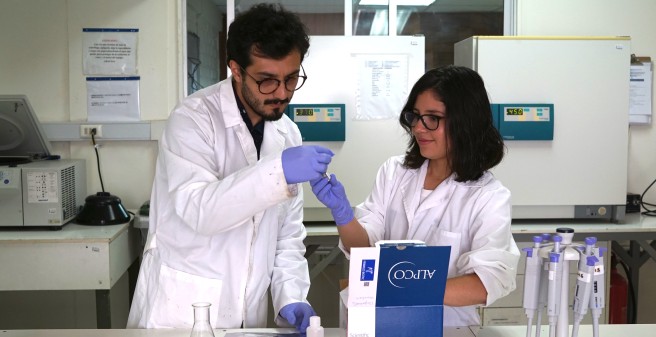-
Pathogenesis of High Altitude Pulmonary Hypertension (HAPH) in Chilean mining workers
Investigators: Prof. Dr. Julio Brito, Prof. Dr. Patricia Siques (Iquique);
Prof. Dr. Rainer Böger, Dr. Juliane Hannemann (Hamburg)
Living at high altitude, under the conditions of chronic hypobaric hypoxia, implies functional and morphological changes in the right ventricle and pulmonary vasculature with an incidence of high-altitude pulmonary hypertension (HAPH) as high as 10%. Recently, a new type of exposure to high altitude has become of interest - long-term chronic intermittent hypoxia (CIH), which has been acknowledged as a distinct pathophysiological condition. This exposure implies long-term exposure to shifts of 4 to 15 days at an altitude above 3,500 m, which are followed by a resting period a limited number of days at sea level. In the Andean regions of Chile, mining, observatory, army, and frontier control personnel are frequently exposed to these conditions, and their numbers have been dramatically increasing. In Chile alone, it has been estimated that there are approximately 100,000 workers exposed to this condition. However, many aspects of the underlying molecular mechanisms and clinical consequences are not yet well known. Some studies in humans have demonstrated changes in the right heart circulation that are similar to those occurring in chronic hypoxia, such as a rise in pulmonary artery pressure and right ventricular enlargement and/or hypertrophy. Remodeling of pulmonary vessels has also been demonstrated in animal models.
Our studies aim to understand the molecular mechanisms that are activated during chronic intermittent hypobaric hypoxia and linked to the pathogenesis of elevated pulmonary arterial pressure and right ventricular hypertrophy and failure. With this, we hope to be able to discover predictive biomarkers that are mechanistically linked to the pathophysiology, in order to improve diagnostics, enable preventive measures, and enhance therapeutic approaches.
Project partners and funding: Universidad Arturo Prat, Iquique (Chile), Universitätsklinikum Hamburg-Eppendorf (Germany)
-
Molecular mechanisms of hypoxic pulmonary vasoconstriction: Involvement of the ADMA / DDAH Pathway
Investigators: Dr. Juliane Hannemann, Prof. Dr. Rainer Böger (Hamburg)
Hypoxia is a deadly threat to every cell and to the organism as a whole. Complex physiological and molecular mechanisms have evolved to help the body to survive under hypoxic conditions. In the pulmonary and systemic circulation, hypoxia leads to opposite responses: In the systemic circulation, hypoxia causes vasodilatation which is mediated by nitric oxide (NO). By contrast, hypoxia leads to vasoconstriction in the pulmonary circulation. This apparently paradoxic phenomenon has been known as the Euler-Liljestrand mechanism since 1946. However, its molecular mechanisms and signalling pathways have remained elusive until today.
Asymmetric dimethylarginine (ADMA) is an endogenous inhibitor of NO synthase. Our earlier work has shown that ADMA levels increase during chronic hypoxia and chronic intermittent hypoxia, both in animal models and in humans exposed to hypobaric hypoxia. ADMA is regulated by biosynthesis through protein arginine methyltransferases (PRMTs) and by metabolism through dimethylarginine dimethylaminohydrolases (DDAH1, DDAH2). An alternative metabolic pathway is mediated by alanine glyoxylate transferase-2 (AGXT2). Our project aims to understand the molecular regulations of these enzymatic pathways during hypoxia on the genetic / epigenetic, expressional and activity levels.
Project partners and funding: Georg & Jürgen Rickertsen Foundation, Hamburg (Germany)
-
Associated projects: High Altitude Medicine and Biology: Phase II
Principal investigator: Prof. Dr. Patricia Siques (Iquique)
This project aims to support research into the metabolic pathways and cardiovascular effects induced by modulation of ADMA and reactive oxygen species at high altitude from the epidemiological and molecular points of view.
Funding: Regional government of Tarapaca (Chile)
-
Associated projects: Education of advanced human capital
Principal investigator: Prof. Dr. Julio Brito (Iquique)
The main focus of this project is to optimize the academic education of young researchers by supporting them to obtain doctoral degrees (PhD) and thereby generate a critical mass of junior researchers to support the regional development of medicine and biology of high altitude.
Funding: Regional government of Tarapaca (Chile)
